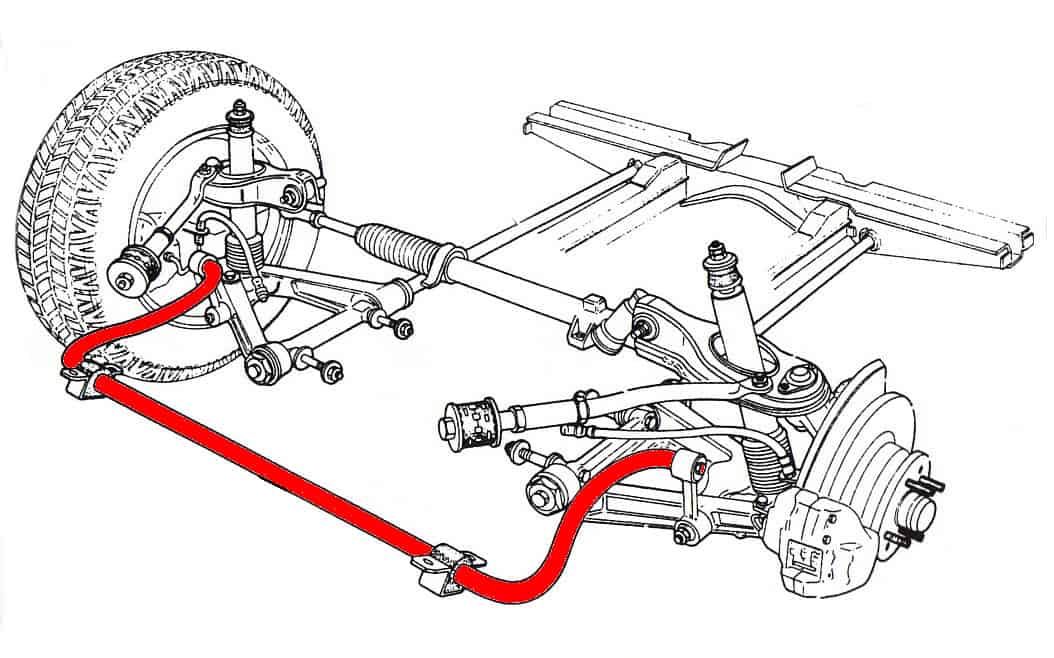Sway bar links are responsible for connecting your vehicle’s sway bar to the chassis. The sway bar eliminates body roll, which improves the handling characteristics of your vehicle. If you have a bad sway bar link, your vehicle will have increased body roll and decreased handling.
Sway bars consist of three main parts, the sway bar itself, the sway bar links, and sway bar bushings. Sway bar links connect the sway bar to the rest of the vehicle. They use bushings to make this connection smooth. Sway bar links and bushings can go bad. Sway bars can crack. Whenever this happens, there are usually noticeable symptoms.
You can still drive the car with bad sway bar links (as long as they are not rubbing something). You do need to be aware that your car or truck will not handle as well as it did before. Don’t push the vehicle hard in corners.
Common Symptoms of Bad Sway Bar Links
Bad sway bar links will often make noise to let you know that something is wrong. Other times, it’ll only be a lack of handling that will tip you off. Here are the most common signs of bad sway bar links.
1. Clunking Noise
The sway bar links will typically connect to the lower control arm on most vehicles (front end). Some vehicles have rear sway bars as well. They both can make noises going down the road, but the front sway bar rattling is easier to notice when driving and much more likely to happen.
Here are the conditions in which a bad sway bar link is going to make noise.
- While not moving at all: Try turning the steering wheel all the way left and all the way right. When sway bar links are bad, there doesn’t need to be vehicle movement to get a clunking sound. It will almost sound like a pop.
- Going over bumps: Even if the sway bar links don’t make noise while turning the steering wheel while not moving, they can make a rattle when going over bumps. This is most prevalent when making a turn and going over a bump at a higher speed (30+ MPH).
- Cornering: The sway bar’s job is to transfer the G force from the side of the vehicle that is on the outside of the corner to the side of the vehicle that is on the inside of the corner. This improves vehicle stability and reduces body roll. When the sway bar goes bad, it’ll be at its worst when cornering hard, like going down a twisty country road. It probably won’t be as pronounced on the highway.
The noise coming from a bad sway bar link/bushing would be described as clunk, rattle, or squeak.
2. Poor Handling
The sway bar’s job is to minimize body roll when steering. When the sway bar bushings/links have gone bad, it causes more weight to be placed on wheels that are on the outside of the corner. This will cause the vehicle to handle poorly. You will also feel this body roll when you go around a corner.
Common Symptoms of Bad Sway Bar Bushings
The symptoms of bad sway bar bushings are going to feel nearly identical to that of bad sway bar links. Really the sway bar bushings are usually the reason why the links have gone bad. You may notice a squeaking sound coming from the wheels when you turn. This indicates that there is play in the sway bar bushings.
Squeak = Sway Bar Bushing
Rattle or Clunk = Sway Bar Link
Bad Sway Bar Bushings VS Bad Sway Bar Links
A bad sway bar bushing is going to make a squeaking noise, whereas a bad sway bar link is going to make a thud or clunking sound. The best thing to do is jack the vehicle up (use jack stands, be careful) and wiggle the sway bar. If you feel any play, check to see where it is coming from and replace the part accordingly.

